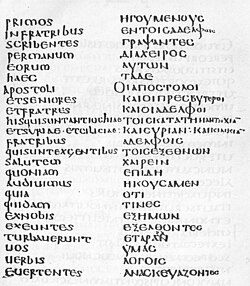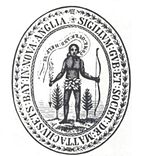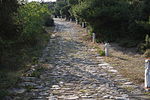
The Epistle to the Philippians is a Pauline epistle of the New Testament of the Christian Bible. The epistle is attributed to Paul the Apostle and Timothy is named with him as co-author or co-sender. The letter is addressed to the Christian church in Philippi. Paul, Timothy, Silas first visited Philippi in Greece (Macedonia) during Paul's second missionary journey from Antioch, which occurred between approximately 50 and 52 AD. In the account of his visit in the Acts of the Apostles, Paul and Silas are accused of "disturbing the city".

Timothy or Timothy of Ephesus was an early Christian evangelist and the first Christian bishop of Ephesus, who tradition relates died around the year AD 97.

Lystra was a city in central Anatolia, now part of present-day Turkey. It is mentioned six times in the New Testament. Lystra was visited several times by Paul the Apostle, along with Barnabas or Silas. There Paul met a young disciple, Timothy. Lystra was included by various authors in ancient Lycaonia, Isauria, or Galatia.
Sopater was the son of Pyrhus, a man from the city of Berea, mentioned in Acts 20:4. Sopater and others accompanied Paul out of Macedonia after a group of Jews began to plot against Paul, and then sailed from Philippi to Alexandria Troas where they met Paul who had gone by land.

Lydia of Thyatira is a woman mentioned in the New Testament who is regarded as the first documented convert to Christianity in Europe. Several Christian denominations have designated her a saint.

Derbe or Dervi, also called Derveia, was a city of Galatia in Asia Minor, and later of Lycaonia, and still later of Isauria and Cappadocia. It is mentioned in the Acts of the Apostles at 14:6, 14:20, 16:1 and 20:4. Derbe is the only city mentioned in the New Testament where the inhabitants adopted Paul's version of Christianity right away.
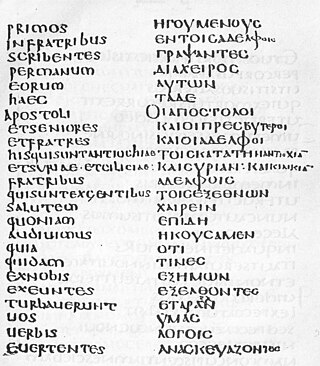
Acts 15 is the fifteenth chapter of the Acts of the Apostles in the New Testament of the Christian Bible. It records "the first great controversy in the records of the Christian Church", concerning the necessity of circumcision, Paul and Barnabas traveling to Jerusalem to attend the Council of Jerusalem and the beginning of Paul's second missionary journey. The book containing this chapter is anonymous, but early Christian tradition uniformly affirmed that Luke composed this book as well as the Gospel of Luke.

Acts 17 is the seventeenth chapter of the Acts of the Apostles in the New Testament of the Christian Bible. It continues the second missionary journey of Paul, together with Silas and Timothy: in this chapter, the Christian gospel is preached in Thessalonica, Berea and Athens. The book containing this chapter is anonymous, but early Christian tradition uniformly affirmed that Luke composed this book as well as the Gospel of Luke.

Acts 11 is the eleventh chapter of the Acts of the Apostles in the New Testament of the Christian Bible. It records that Saint Peter defends his visit to Cornelius in Caesarea and retells his vision prior to the meeting as well as the pouring of Holy Spirit during the meeting. The book containing this chapter is anonymous but early Christian tradition uniformly affirmed that Luke composed this book as well as the Gospel of Luke.

Acts 13 is the thirteenth chapter of the Acts of the Apostles in the New Testament of the Christian Bible. It records the first missionary journey of Paul and Barnabas to Cyprus and Pisidia. The book containing this chapter is anonymous, but early Christian tradition uniformly affirmed that Luke composed this book as well as the Gospel of Luke. From this point onwards, except for the Council held in Jerusalem, Luke's narrative focusses on Paul, his ministry, and the events of his life.

Acts 14 is the fourteenth chapter of the Acts of the Apostles in the New Testament of the Christian Bible. It records the first missionary journey of Paul and Barnabas to Phrygia and Lycaonia. The book containing this chapter is anonymous but early Christian tradition uniformly affirmed that Luke composed this book as well as the Gospel of Luke.

Acts 18 is the eighteenth chapter of the Acts of the Apostles in the New Testament of the Christian Bible. It records the final part of the second missionary journey of Paul, together with Silas and Timothy, and the beginning of the third missionary journey. The book containing this chapter is anonymous, but early Christian tradition uniformly affirmed that Luke composed this book as well as the Gospel of Luke.

Acts 19 is the nineteenth chapter of the Acts of the Apostles in the New Testament of the Christian Bible. It records part of the third missionary journey of Paul, focussing on his time spent in Ephesus. The author of the book containing this chapter is anonymous, but early Christian tradition uniformly affirmed that Luke composed this book as well as the Gospel of Luke.
Acts 20 is the twentieth chapter of the Acts of the Apostles in the Christian New Testament of the Bible. It records the third missionary journey of Paul the Apostle. The narrator and his companions ("we") play an active part in the developments in this chapter. The book containing this chapter is anonymous, but early Christian tradition uniformly affirmed that Luke the Evangelist composed this book as well as the Gospel of Luke.
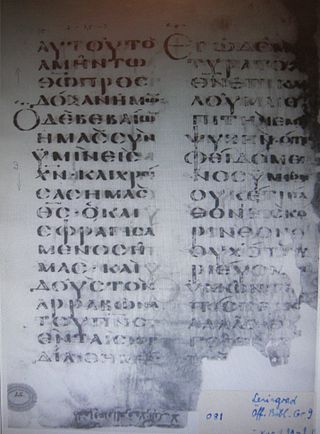
2 Corinthians 1 is the first chapter of the Second Epistle to the Corinthians in the New Testament of the Christian Bible. It is authored by Paul the Apostle and Timothy in Macedonia in 55–56 CE.

2 Corinthians 2 is the second chapter of the Second Epistle to the Corinthians in the New Testament of the Christian Bible. It is authored by Paul the Apostle and Timothy in Macedonia in 55–56 CE.

2 Corinthians 13 is the thirteenth and final chapter of the Second Epistle to the Corinthians in the New Testament of the Christian Bible. It is authored by Paul the Apostle and Timothy in Macedonia in 55–56 CE.

Ephesians 1 is the first chapter of the Epistle to the Ephesians in the New Testament of the Christian Bible. Traditionally, it is believed to have been written by Apostle Paul while he was in prison in Rome, but more recently, it has been suggested that it was written between AD 80 and 100 by another writer using Paul's name and style. This chapter contains the greeting, followed by a section about "The Blessing of God" and Paul's prayer.

Ephesians 4 is the fourth chapter of the Epistle to the Ephesians in the New Testament of the Christian Bible. Traditionally, it is believed to have been written by Apostle Paul while he was in prison in Rome, but more recently, it has been suggested that it was written between AD 80 and 100 by another writer using Paul's name and style. This chapter is a part of Paul's exhortation, with the particular section about the mutual interdependence of the Christians as the church and how they should live in the world (4:17–5:20).

Titus 3 is the third and final chapter of the Epistle to Titus in the New Testament of the Christian Bible. The letter is traditionally attributed to Paul the Apostle, sent from Nicopolis of Macedonia, addressed to Titus in Crete. Some scholars argue that it is the work of an anonymous follower, written after Paul's death in the first century AD. This chapter contains the author's instruction for the church as a community with responsibilities in the public realm, towards the government and also towards individuals, concluded with some personal requests for Titus before the final benediction.
